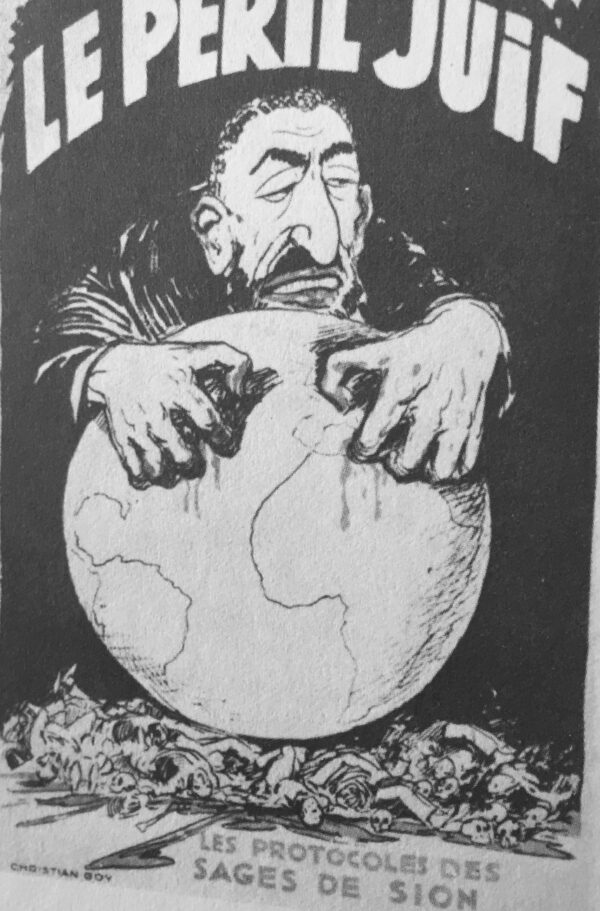The commonly accepted definition of antisemitism is crystal clear. Or is it?
Until quite recently, antisemitism was universally understood to encompass a broad spectrum of hostility toward Jews. This animus could assume multiple forms, but at the end of the day it was an expression of unambiguous dislike of the Jewish people. This form of hatred, regardless of its source, has not changed in hundreds of years.

Of late, a new definition has appeared. It is promoted by the International Holocaust Remembrance Alliance, which blandly and self-evidently defines antisemitism as “a certain perception of Jews, which may be expressed as hatred toward Jews.”
There are no issues with this straightforward, unencumbered definition. Problems only arise after Israel is included in the mix of examples cited by the IHRA to define antisemitism.
In the main, progressives, leftists, Palestinians, Arabs and Muslims object to these clauses, regarding them as an infringement of free speech, a threat to academic freedom, and a device to quash legitimate criticism of Israel.
On the face of it, they seem to have a point. But they forget that anti-Zionism is and has often been deployed as a Trojan horse to disseminate classic antisemitism. We often hear antisemites describes Jews and their supporters as “Zionists.” They don’t fool us for even a moment.
This is a complex, complicated and controversial issue, to say the least. Nonetheless, a host of universities and local jurisdictions, including the Canadian province of Ontario, have adopted this definition to monitor, teach and combat antisemitism.
Thirty six major countries, ranging from Britain, Spain and France to Canada, Italy and Germany have endorsed the IHRA’s definition of antisemitism as well. Their endorsement of it is a stinging rebuke to critics who argue that it stifles free speech.
Several days ago, the U.S. deputy assistant Secretary of State, Kara McDonald, announced that the Biden administration embraces it.

“We must educate ourselves and our communities to recognize antisemitism in its many forms so that we can call hate by its proper name and take effective action,” she told the Organization for Security and Cooperation in Europe. “That is why is the IHRA’s definition, with its real-world examples, is such an invaluable tool.”
“We applaud the growing number of countries and international bodies that apply it,” she added. “We urge all that haven’t done so to do likewise.”
The IHRA cites seven examples of antisemitism that reference Israel:
Denying the Jewish people the right of self-determination by claiming that the existence of Israel is a racist endeavor.
Comparing the policies of Israel to that of Nazi Germany.
Holding Jews collectively responsible for Israel’s actions.
Accusing Jews, or Israel, of inventing and exaggerating the Holocaust.
Accusing the Jewish citizens of foreign countries of being more loyal to Israel than their own homelands.
Applying double standards to Israel by expecting its behavior to to be better than other countries.
Using traditional antisemitic symbols and images to characterize Israel and Israelis.
In my opinion, these critiques converge with antisemitism.
A person who denies Israel’s right to exist is engaging in antisemitism, whether or not they are personally antisemitic. If Israel is a racist state, then Muslim and European ethno states are similarly racist. Racism abounds in Israel, just as antisemitism exists in most countries. Is that a valid reason for denying their existence? The answer is a resounding no. We do not live in a perfect world.

To draw a comparison between the policies of Israel and Nazi Germany is ahistorical — a grotesque and obscene travesty of history.
Jews in the Diaspora most definitely cannot be held responsible for Israel’s policies. Anyone who scrapes the bottom of the barrel to resort to this tactic is an arch cynic or an antisemite.
The Holocaust was real. There is no need to exaggerate its scope and intent. Like World War II or the U.S. Civil War, it happened, period. Holocaust denial is a form of antisemitism.
The accusation of dual loyalty is ageless and groundless. Antisemites often seize on it to defame Jews.
Israel is no better than any other nation, and I can think of dozens of countries whose treatment of their citizens is far worse.
When enemies of Israel use common anti-Jewish symbols and images to denounce Israel or Israelis, they are clearly guilty of antisemitism.
I have no wish or desire to limit or inhibit debate about Israel and the Arab-Israeli conflict. Criticism of Israel per se is completely acceptable. It is not automatically antisemitism. I count myself as a critic. But when critics cross that red line into the swamp of antisemitism, they should pause and reflect before they sink deeper into it.

In short, I do not believe the IHRA definition of antisemitism inhibits fair and balanced criticism of Israel. The IHRA is simply asking people to be careful and measured when they launch polemics against Israel.
All too often, as we have seen for decades now, anti-Zionism is the other side of the coin of antisemitism.
